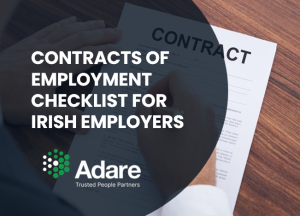The employment contract is an essential legal document that governs the relationship between Employers and Employees. Having thorough employment documents is crucial not only for ensuring compliant written terms of employment but also for minimising the risks of misunderstandings and disputes with Employees. To get the most out of employment contracts, they should not be viewed as another legal compliance task but as a way to minimise risk, maintain fair practices, and foster positive workplace relations.
Compliance
Every Employer must adhere to a range of specific statutory requirements that govern employment relations. These legal requirements are designed to protect both the Employer and the Employee, and they form the legal basis of the terms outlined in the contract of employment.
Compliant contracts safeguard against potential disputes or legal challenges by clearly outlining the rights and responsibilities of both parties. With a well-drafted, legally compliant contract in place, Employers can significantly reduce the risk of misunderstandings or conflicts with their Employees.
Failure to ensure compliance with employment laws can lead to serious consequences. The Workplace Relations Commission’s Inspection Service visit workplaces to review Employer compliance with various employment statutes. As part of their work, inspectors will ask Employers to produce a copy of the written terms of employment, including procedures for bullying and harassment, grievance and discipline and the procedures governing dismissal.
Inspectors address contraventions and, where necessary, issue notices to Employers and bring legal proceedings to enforce compliance. A robust employment contract is not therefore just good practice, it should be a priority to ensure these avoidable legal risks don’t jeopardise long-term business success.
The Wider Benefits of Detailed Employment Contracts
Employee Clarity
A detailed contract of employment provides clarity for Employees by clearly defining their roles, responsibilities, and expectations within the Organisation. This helps Employees understand what is expected of them, leading to better performance and minimising scope for misunderstandings. Equally important is setting out the critical employment details such as working hours, place of work, remuneration, benefits, and holiday entitlements. These provisions ensure that Employees are well-informed about their rights and the terms of their employment, promoting transparency and trust in the workplace.
Consistency and Fairness
Using a standardised contract of employment for all Employees fosters consistency and fairness across the workforce. This ensures that all Employees are treated equally and that their terms of employment are clear, meet the relevant legal requirements and minimise the risk of discriminatory treatment. By ensuring that all Employees are given the same fundamental terms of employment, Employers can minimise the risk of legal claims and maintain a positive workplace culture based on applying the principles of fair treatment.
Key Components of a Compliant Contract of Employment
A legally compliant contract must meet several essential requirements under Irish employment law, which protects both Employees and Employers. These elements include:
Essential Legal Requirements
Specific terms of employment must be provided in writing under the Terms of Employment (Information) Act 1994 (as amended). Employers are also required to provide details on a range of statutory entitlements ranging from working time and sick leave to holiday entitlements and maternity leave.
Sector-Specific Requirements
Certain industries may have additional regulations that need to be included in employment contracts. For example, construction workers may require specific safety protocols, while Employees in the hospitality industry might need to address hours worked and specific requirements around the treatment of tips.
Role-Specific Requirements
Depending on the nature and seniority of the role, contracts may need to incorporate additional terms such as confidentiality agreements, intellectual property clauses, and other industry-specific details.
Common Pitfalls Small to Medium Sized Businesses Face
Small businesses, especially those that may not have a dedicated HR department, often face challenges in maintaining compliant contracts of employment. Here are some common pitfalls:
Outdated Contracts
One of the biggest risks small to medium sized businesses face is failing to ensure contracts of employment keep up with the latest developments in employment law. Employment laws change frequently, and if employment contracts are not updated regularly, they may no longer meet legal requirements.
Misclassification of Employees
Classification of workers is a particularly topical compliance issue. Many Organisations mistakenly classify workers as independent contractors rather than Employees. This mistake, which became particularly relevant following the Supreme Court ruling in the Karshan case, can lead to severe legal and financial consequences.
Inconsistent Documentation
Organisations that adopt an ad hoc approach to employment contracts increase the risk of disputes with Employees. A more standardised and formal, written contract is crucial for establishing clear expectations, fair treatment and ensuring both parties are legally protected.
Employment Contract Resource – Employer Checklist
Ensuring your contracts of employment are fully compliant with legal requirements is essential to the smooth operation of any business. Not only does it foster trust and clarity between Employers and Employees, it also helps mitigate legal risks and potential disputes.
Small to medium sized businesses should take proactive steps to review and update their employment contracts regularly. To help you get started, consider using Adare’s checklist to ensure your contracts meet all legal requirements.
Download your free checklist today
If you’re unsure about your current contracts or need assistance in drafting compliant documents, contact Adare’s team of HR experts today.
